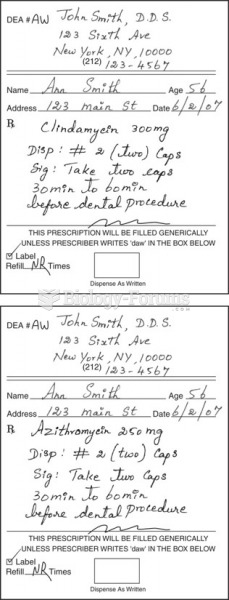|
|
|
A recent study has found that following a diet rich in berries may slow down the aging process of the brain. This diet apparently helps to keep dopamine levels much higher than are seen in normal individuals who do not eat berries as a regular part of their diet as they enter their later years.
This year, an estimated 1.4 million Americans will have a new or recurrent heart attack.
There are more sensory neurons in the tongue than in any other part of the body.
Bacteria have been found alive in a lake buried one half mile under ice in Antarctica.
Though newer “smart” infusion pumps are increasingly becoming more sophisticated, they cannot prevent all programming and administration errors. Health care professionals that use smart infusion pumps must still practice the rights of medication administration and have other professionals double-check all high-risk infusions.







